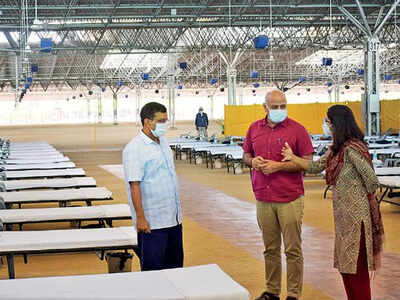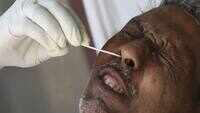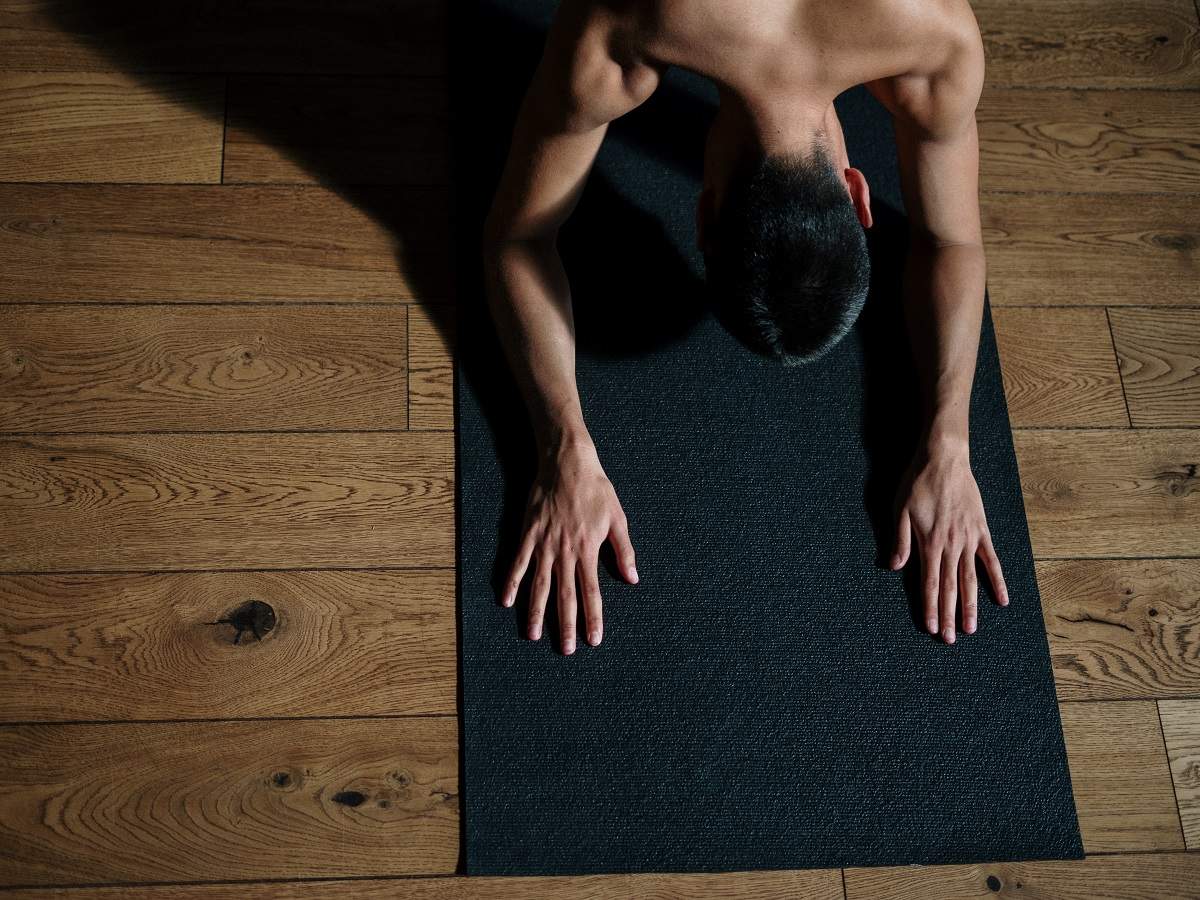
NEW DELHI: On the outskirts of south Delhi close to the leafy Asola-Bhatti sanctuary are farmhouses and villas. Among them is the ashram of the Radha Soami Satsang Beas, which is now being converted into a 10,000-bed Covid care facility. Under a vast shed on the 29-acre space used for religious congregations, endless rows of beds are been installed, soaps, water and bins being placed.
Overseeing the work, Vikas Sethi, secretary of the Radha Soami Satsang Beas centre, exclaimed that when the shed, equipped with 5,000 fans, was erected two decades ago, nobody could have envisaged its use as a hospital ward one day. “We were informed about the lieutenant governor arriving on Sunday for a feasibility check. Things were set into motion four days ago,” revealed Sethi. Government officials said the new facility could start receiving Covid patients by the first week of July.
Chief minister Arvind Kejriwal and deputy CM Manish Sisodia inspected the work under way at the Radha Soami centre on Thursday. Regarding the world's largest temporary Covid care facility, Kejriwal said, “Patients with mild symptoms or asymptomatic patients will be admitted here. Generally, such patients can be treated at home, but in many cases, people do not have adequate space in their homes. There are no separate toilets in the homes of poor people, and so isolation centres like the Radha Soami Satsang Beas will serve them better.” Currently over 25,000 corona-positive Delhiites are in home isolation, and their health is regularly assessed remotely by surveillance units set up in the districts.
B M Mishra, district magistrate, South, elaborated, “The 10,000 beds will be placed in 100 subsections, each with 100 beds. The ashram will provide the space and revamp the flooring, while the medical operations, manpower and healthcare staff are the responsibility of the district administration.” Mishra added that 10% of the beds would have oxygen points.
Trained manpower will be key to running such a massive operation, and a number of agencies are expected to pitch in. Sonalika Jivani, SDM, Mehrauli, informed, “We will have around 200 doctors and 600 nurses and paramedics. ITBP is adopting 1,000 beds and will also provide doctors and paramedics. Similarly, the army is likely to take care of some sections. The rest will be managed by Delhi Health Services.”
While the campus of the spiritual organisation has numerous buildings and grounds, the hub of activities from July 1 will be the central satsang centre — a pillared hall with roofing, fans, PA system and CCTV cameras. Since the ashram was built to accommodate gatherings of several lakh, it was considered ideal to meet the huge demand for beds likely by the end of July. Sethi also said, “We have a community kitchen where we prepared 65,000 packets of food for migrant labourers every day, so food for 10,000 patients isn’t a problem.” The toilet facilities include 1,000 commodes and urinals. The 70 acres at the complex also allows space for parking.
The shed has a sandy floor, but vinyl tiles will be installed to make it easier to disinfect the premises. “Sampling has already started and we have seen a few options,” Sethi said, pointing to the brown vinyl floor of the small model ward. Prefabricated cardboard beds will be used. “These will be easier to disinfect and dispose of,” the secretary added. SDM Jivani said that the beds and mattresses were being donated by various agencies.
Earlier on Thursday, Kejriwal also attended a meeting with Union home minister Amit Shah, where senior Delhi-NCR officials were present to discuss the pandemic. “We talked about how the entire NCR should work together in the battle against Covid-19. We felt that Delhi could not be separated from NCR, but had to fight the infection together,” said Kejriwal.
The CM added that it is likely more ICUs will have to be set up in the coming days. “I am in talks with doctors and civic authorities to figure out how to do this,” he said.
With Delhi government expecting the number of patients to touch 5.5 lakh at July end, innovation is the buzzword. From modified railway coaches to posh hotel rooms — and now a religious gathering place — the city is boosting the infrastructure required to weather the peak of infection.
Overseeing the work, Vikas Sethi, secretary of the Radha Soami Satsang Beas centre, exclaimed that when the shed, equipped with 5,000 fans, was erected two decades ago, nobody could have envisaged its use as a hospital ward one day. “We were informed about the lieutenant governor arriving on Sunday for a feasibility check. Things were set into motion four days ago,” revealed Sethi. Government officials said the new facility could start receiving Covid patients by the first week of July.
Chief minister Arvind Kejriwal and deputy CM Manish Sisodia inspected the work under way at the Radha Soami centre on Thursday. Regarding the world's largest temporary Covid care facility, Kejriwal said, “Patients with mild symptoms or asymptomatic patients will be admitted here. Generally, such patients can be treated at home, but in many cases, people do not have adequate space in their homes. There are no separate toilets in the homes of poor people, and so isolation centres like the Radha Soami Satsang Beas will serve them better.” Currently over 25,000 corona-positive Delhiites are in home isolation, and their health is regularly assessed remotely by surveillance units set up in the districts.
B M Mishra, district magistrate, South, elaborated, “The 10,000 beds will be placed in 100 subsections, each with 100 beds. The ashram will provide the space and revamp the flooring, while the medical operations, manpower and healthcare staff are the responsibility of the district administration.” Mishra added that 10% of the beds would have oxygen points.
Trained manpower will be key to running such a massive operation, and a number of agencies are expected to pitch in. Sonalika Jivani, SDM, Mehrauli, informed, “We will have around 200 doctors and 600 nurses and paramedics. ITBP is adopting 1,000 beds and will also provide doctors and paramedics. Similarly, the army is likely to take care of some sections. The rest will be managed by Delhi Health Services.”
While the campus of the spiritual organisation has numerous buildings and grounds, the hub of activities from July 1 will be the central satsang centre — a pillared hall with roofing, fans, PA system and CCTV cameras. Since the ashram was built to accommodate gatherings of several lakh, it was considered ideal to meet the huge demand for beds likely by the end of July. Sethi also said, “We have a community kitchen where we prepared 65,000 packets of food for migrant labourers every day, so food for 10,000 patients isn’t a problem.” The toilet facilities include 1,000 commodes and urinals. The 70 acres at the complex also allows space for parking.
The shed has a sandy floor, but vinyl tiles will be installed to make it easier to disinfect the premises. “Sampling has already started and we have seen a few options,” Sethi said, pointing to the brown vinyl floor of the small model ward. Prefabricated cardboard beds will be used. “These will be easier to disinfect and dispose of,” the secretary added. SDM Jivani said that the beds and mattresses were being donated by various agencies.
Earlier on Thursday, Kejriwal also attended a meeting with Union home minister Amit Shah, where senior Delhi-NCR officials were present to discuss the pandemic. “We talked about how the entire NCR should work together in the battle against Covid-19. We felt that Delhi could not be separated from NCR, but had to fight the infection together,” said Kejriwal.
The CM added that it is likely more ICUs will have to be set up in the coming days. “I am in talks with doctors and civic authorities to figure out how to do this,” he said.
With Delhi government expecting the number of patients to touch 5.5 lakh at July end, innovation is the buzzword. From modified railway coaches to posh hotel rooms — and now a religious gathering place — the city is boosting the infrastructure required to weather the peak of infection.

Coronavirus outbreak
Trending Topics
LATEST VIDEOS
More from TOI
Navbharat Times
Featured Today in Travel
Get the app









